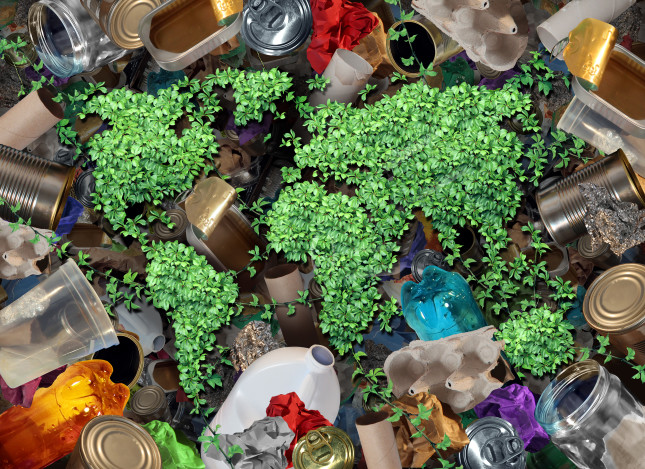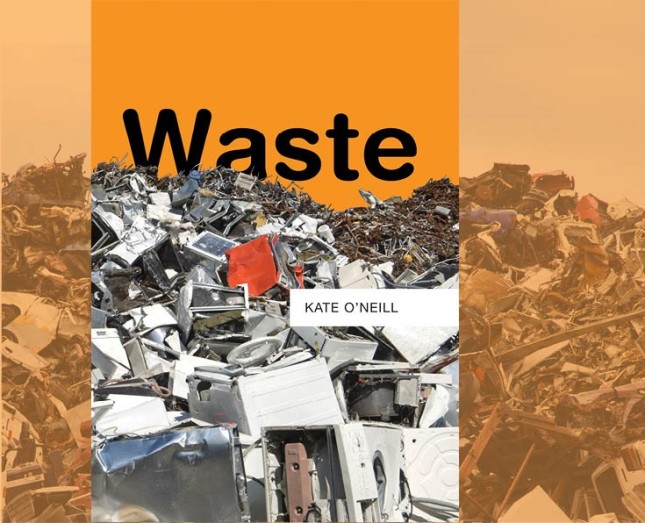-
What China’s Ban on Plastic Scrap Means for Global Recycling: Q&A with Kate O’Neill, Author of “Waste”
November 27, 2019 By Amanda Mei
Once a designated “recycling bin” for the world’s post-consumer scrap, China said no more when it instituted a ban on scrap imports in 2018. Countries that previously sent bulks of waste to China, such as plastic, paper, and electronics, are grappling for solutions in the face of China’s “Operation National Sword.” For example, U.S. municipalities that shipped 4,000 shipping containers per day in 2016 to China are now investing in incinerators or cutting recycling programs altogether.
Between 1992 and the introduction of the ban, imports of plastic scrap to China accounted for 45 percent of the global plastic waste trade (106 million metric tons). While Chinese industries used some of the material as feedstock, the vast quantities of imported scrap overwhelmed recycling infrastructure. Like the informal e-waste workshops in southern China, plastic recycling businesses were not always well-regulated and generated pollution.
In its first year, Operation National Sword led to near-total elimination of scrap imports in 24 categories, including plastics such as PET, PE, and PVC. The policy sets a nearly impossible to meet contamination standard of 0.5 percent. In the United States, material recovery facilities process bales of recycled plastic that are often contaminated with food, paper, and metals, with contamination rates hitting 25 percent.
China’s plastic import ban shocked global waste markets and accelerated a global awakening to the extensive plastics pollution crisis. Eight million metric tons of plastic “leaks” into the world’s oceans every year. Plastic pollution is a problem that won’t go away soon; it causes hazards to human, wildlife, and environmental health (estimates of damages to the marine environment alone amount to $13 billion each year), and can take up to 1,000 years to decompose.
While the challenges posed by China’s ban are significant, there are also a number of opportunities. Countries around the world could be pushed to find resource value in waste, manage risks in the global trade, and develop new national and international policies for recycling. Kate O’Neill, author of 2019 book Waste and professor at UC Berkeley, joined the China Environment Forum to discuss view of waste.
In the book Waste, you highlight our need to think of waste in new ways and say it is a new “global resource frontier.” Instead of an empty plastic bottle as an object to toss, you see it as a scrap material and a potential resource. What does this mean in terms of plastics more broadly?
Plastics really straddle the boundary between scrap and waste. Plastics are an unusual scrap, in that it is not like the metals you find in e-waste, which are pretty rare and unambiguously valuable. Plastics downgrade easily—even the best quality plastics are hardly ever recycled more than once. But you can take plastics, high-quality plastics, and reprocess them. Companies are going to buy this plastic and put it back into production.
I try to look at the plastic scrap trade from Chinese buyers’ point of view. They have a demand for scraps to be recycled into an industrial feedstock. It’s not only an issue of us shipping them our waste; they actually want it. But that doesn’t mean it comes with no costs.
China’s Operation National Sword Policy was a shift for countries around the world that used to ship their plastic recyclables to China. Do you see a silver lining for commercial, municipal, and national management of plastic waste in the United States?
There’s a lot of entrepreneurialism going on in many countries, such as developing and commercializing new technologies like turning plastics into SynGas (a gaseous product that has value as fuel). That’s not far from incineration, another disposal option for plastics, which can be quite polluting. What the world has to work toward is a longer-term solution—a functional equivalent to plastics.
People in the United States are also improving recycling facilities and collection stations where things are sorted, and creating better places for plastics to be broken down. I had an interview the other day about artificial intelligence in this context. New York City is in talks to test-run garbage trucks that are driverless, as well as sorting technologies in facilities where recyclables end up. This work is also currently done by humans and will likely cut out jobs.
For the next few years, working up the political chain will be a useful way to strategize. There’s some interesting stuff floating around in Washington D.C., such as a Zero-Waste Act that is part of the Green New Deal. And more likely to succeed in the short term are efforts to develop national recycling standards.
The overall goal of the American recycling industry right now is to develop technologies and capacities to get plastic scraps down to China’s strict contamination standards. The other is to create scrap that can be sent to other markets; Turkey’s accepting the scrap still, some countries in Latin America might also take it. Maybe we can use the scrap here in the US. But the goal for many waste processors is to tailor the scrap to China’s specifications.

China also struggles to implement effective recycling systems. The government has shut down thousands of small informal recycling workshops that were highly polluting. How does China need to move forward to manage waste?
I think quite a bit of National Sword was about a desire for economic rationalization on the part of Beijing. The government was pretty fed up with the way plastics were being dealt with when they got to China. In an informal setting, money changes hands and never makes it to the state.
The example I use is how the government dealt with e-waste in Guiyu. You had the mish-mash of yards and workshops for recycling without any safety equipment. The Chinese government came in and stopped importing e-waste (although they didn’t entirely stop it)—built an industrial park so all the more orderly workshops could be used as a destination for e-waste. I’m wondering if that’s not the goal with the informal plastics recycling sector—to bring industries who buy and sell the plastic scrap under state control as well.
In the short term, China’s doing two things that have been prominent in the news. One is massive incineration capacity upgrade. The latest Five-Year Plan focused on building hundreds, maybe thousands of incineration plants—problematic in so many ways if not properly looked after. The other thing that’s been well covered has been the Shanghai Waste Ordinance that requires citizens to sort household wastes.
Awareness of the impact of wastes in the global political economy has risen in the past two decades. Recycling has gone global—my yogurt container could travel to China and come back to me as a detergent bottle. Do you think we need global agreements to stem the flow of plastic waste into the ocean?
One of the key theses of the book was how we have to really think about how we reframe global governance of waste as scrap, or as a globalized commodity that moves around but still poses significant risks. Although the Basel Convention, originally signed in 1989, just passed the ban amendment, the convention’s never been super successful. If a company wants to export plastics to another country the amendment requires that the company have prior informed consent. Who’s going to sign that consent—a customs official who can be bribed?
Global regulation needs to take a step back and figure out how we make this all make sense. With plastics, there’s converging concerns about marine plastics, particularly in the context of the Pacific. But that’s focusing on when plastics wash offshore, which isn’t terribly fundamental. I’m interested to see if any of this debate winds up at the World Trade Organization.
Amanda Mei is a research intern at the China Environment Forum. She graduated from Yale University in 2018 with a degree in environmental studies.
Sources: The Atlantic, The Balance Small Business, Basel Action Network, CityLab, Library of Congress, National Geographic, NDRC China, PRI, Resource Recycling, Science Advances, United Nations Environment Programme, “Waste” by Kate O’Neill, Waste Dive.
Photo Credit: Header image from Shutterstock. Cover of book “Waste” (2019) by Kate O’Neill, edited by Amanda Mei.
 A Publication of the Stimson Center.
A Publication of the Stimson Center.







